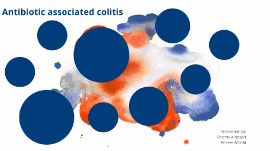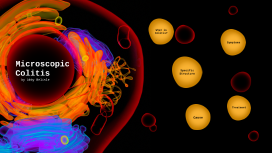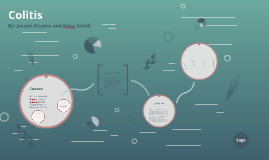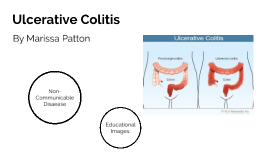Colitis
Transcript: Colitis What Is It? Colits is the swelling or inflammation of the large intestine. This, is a healthy colon. This, is a colon with colitis What Causes Colitis? Signs and Symptoms Treatment The goals of treatment are to: Control the acute attacks Prevent repeated attacks Help the colon heal DIET AND NUTRITION Certain types of foods may worsen diarrhea and gas symptoms, especially during times of active disease. Diet suggestions include: Eat small amounts of food throughout the day. Drink plenty of water (drink small amounts throughout the day). Avoid high-fiber foods (bran, beans, nuts, seeds, and popcorn). Avoid fatty, greasy or fried foods and sauces (butter, margarine, and heavy cream). Limit milk products if you are lactose intolerant. Dairy products are a good source of protein and calcium. MEDICATIONS Medications that may be used to decrease the number of attacks include: 5-aminosalicylates such as mesalamine or sulfazine, which can help control moderate symptoms Immunomodulators such as azathioprine and 6-mercaptopurine Corticosteroids (prednisone and methylprednisolone) taken by mouth during a flare-up or as a rectal suppository, foam, or enema Infliximab (Remicade) or other biological treatments, if you do not respond to other medications SURGERY Surgery to remove the colon will cure ulcerative colitis and removes the threat of colon cancer. Surgery is usually recommended for patients who have: Colitis that does not respond to complete medical therapy Changes in the lining of the colon that are thought to be precancerous Serious complications such as rupture of the colon, severe bleeding, or toxic megacolon Most of the time, the entire colon, including the rectum, is removed. Afterwards, patients may need a surgical opening in the abdominal wall (ileostomy), or a procedure that connects the small intestine to the anus to help the patient gain more normal bowel function. Prognosis About 10% of people have serious complications (such as perforation or massive bleeding) Approximately 10% of people never have another flare-up after their first one For those who are diagnosed with ulcerative proctitis, where the disease is located only in the rectum, the chance of disease spreading up through the colon is 10% to 30%. Anywhere from 10% to 40% of patients with ulcerative colitis will require surgery to treat their disease. Colon cancer develops in about 5% of people with ulcerative colitis. The risk of colon cancer is increased after 8 to 10 years of active disease and having more extensive disease (pancolitis). Aloe vera juice is accessible in quantity and may simply be integrated into your daily diet. In addition to aloe, other natural items are employed as a natural treatment for ulcerative colitis. These consist of chamomile, turmeric, and boswellia. All can be included into your every day routine and greatly assist to alleviate signs and symptoms and can be identified at most wellness food stores and online. References Gihealth. (n.d.). Preventing Colon Cancer [Web log post]. Retrieved May 15, 2011, from http://www.gihealth.com Harpin, A. (2008). Ulcerative Colitis Practice Guidelines in adults (Rep.). Retrieved May 15, 2011, from AdvancesInMedicine website: www.advances-in-medicine.com Harpin, A. (2010). Colitis. Colitis. Retrieved May 15, 2011, from http://www.ncbi.nlm.nih.gov PubMed. (2009, October 13). Colitis (Canada, A.D.A.M.). Retrieved from http://www.ncbi.nlm.nih.gov PubMed. (2010, October). Ulcerative Colitis (Canada, A.D.A.M., PubMed). Retrieved May 15, 2011. Remedies (2009, October 13). Ulcerative Colitis: Fun Facts (Canada, A.D.A.M.). Retrieved fromhttp://cureremedies.org/ PubMed. (2009, October 13). Colitis (Canada, A.D.A.M.). Retrieved from http://www.ncbi.nlm.nih.gov Ulcerative PubMed. (2010, October). Ulcerative Colitis (Canada, A.D.A.M., PubMed). Retrieved May 15, 2011. Harpin, A. (2008). Ulcerative Colitis Practice Guidelines in adults (Rep.). Retrieved May 15, 2011, from AdvancesInMedicine website: www.advances-in-medicine.com Ulcerative colitis is a chronic disease specifically of the immune system, where the immune system is very powerful, and attacks the large intestine. Acute and chronic infections, including food poisoning Inflammatory disorders (ulcerative colitis, Crohn's colitis, lymphocytic and collagenous colitis) Past radiation to the large bowel CureRemedies (2009, October 13). Ulcerative Colitis: Fun Facts (Canada, A.D.A.M.). Retrieved from http://cureremedies.org/ Gihealth. (n.d.). Preventing Colon Cancer [Web log post]. Retrieved May 15, 2011, from http://www.gihealth.com Solberg IC, Lygren I, Jahnsen J, Aadland E, et al. "Clinical course during the first 10 years of ulcerative colitis: results from a population-based inception cohort (IBSEN Study)." Scand J Gastroenterol 2009;44:431-440. 24 Mar 2010 Abdominal pain and cramping that usually disappears after a bowel movement Abdominal sounds (a gurgling or splashing sound heard over the intestine) Blood and pus in the

















